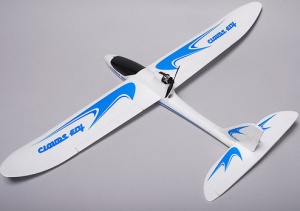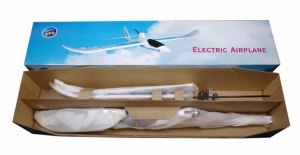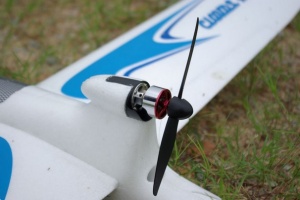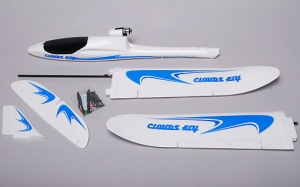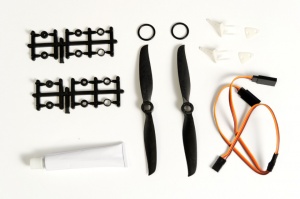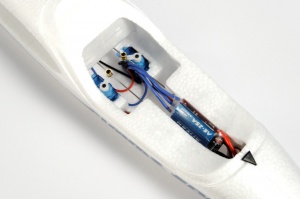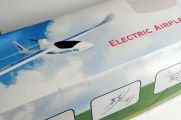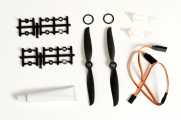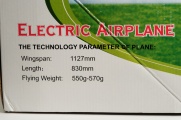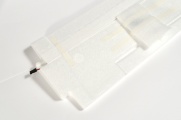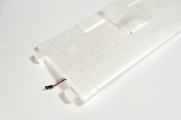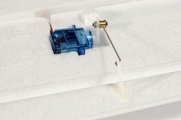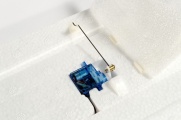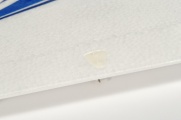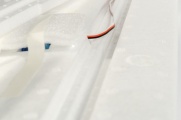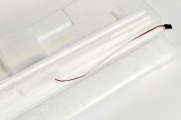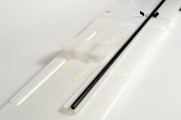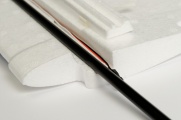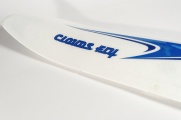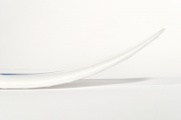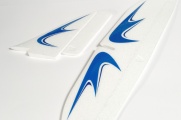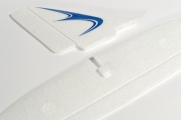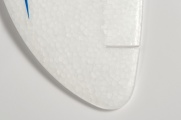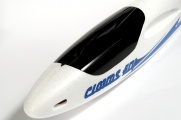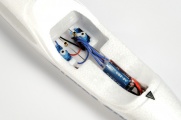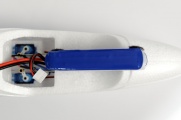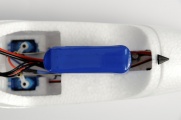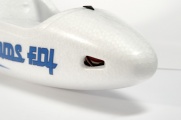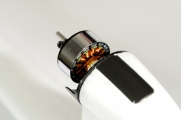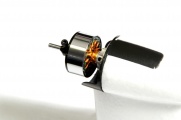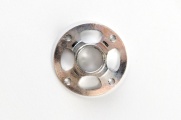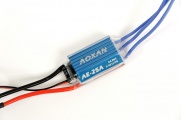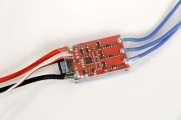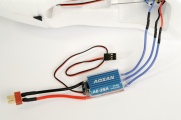AXN Clouds Fly
From ivc wiki
Jump to navigationJump to search
This is a powered remote controlled glider plane. It is balanced, forgiving in flight, has curved wingtips for stability, a powerful motor for steep climbs and ultra fast pass-bys, and characteristics to glide around forever on thermals.
Specifications
- Also called Floater Jet by Hobby King
- Released: 2008
- Type: Powered glider, high mount pusher
- Airframe: Dense and smooth EPO (Expanded polypropylene) foam [1] [2] [3]
- Length: 840 mm (measured)
- Wingspan 1280 mm (measured)
- Wing area: 0.23 m^2 / 23dm^2
- Center of gravity: 51.5 mm, range 49-55 mm from LE
- Stock weight: 600-650 grams (Servo, ESC, Rx, Bat)
- Payload capacity: 200-350 grams (at least) [4]
- Reinforcement: Black 750x8 mm glass fiber spar tube in the wings and embedded tube along in the tail section
- Recommended flying area: 300x300 meters
- Product page: http://www.rc-model.cn/802.htm
Kits
- AXN-clouds AXN Floater-Jet with Servo, Motor, ESC, EPO (PNF) - Hobby King 53USD [5]
- AXN-C-MOT Floater-Jet EPO with Motor (ARF) - Hobby King March 2011 40USD
- AXN-C-KIT Floater-Jet EPO (ARF) - Hobby King March 2011 35USD
- AXN-802SET AXN Floater-Jet Set EPO with servo, motor, esc, battery (PNF) - Low Price RC 60USD
- AXN-802 AXN Floater-Jet EPO with motor (ARF) - Low Price RC 40USD
- Similar airplanes:
Manual
- Manual for AXN Clouds Fly
- Manual for BMI Arrow - Setup is essentially the same
- Manual for Align RCE-BL15X ESC - Programming is the same
Stock setup
- Motor: AX-2208N 2150 KV Outrunner 27.7x31.4mm (DxW), 3mm shaft, 40 gram, 18A with 5x5 prop 3s, 9 mm tube motor mount, 16x16 mm bolt pattern [8]
- Propeller: EMP 5x5 Electric propeller, comes in pairs
- ESC:
- Servos: Blue Micro Servo 9 grams JR-connector
My Setup
- AXN Clouds Fly Setup - My preferred way to set-up the plane and pre-flight procedure.
Tips
- Center of gravity 49-55 mm from leading wing edge, on wing spar rods, 56 mm minimum drag [12] [13] [14] [15] [16] [17]
- CG perfect with 3S 2200 mAh battery, a 1300 mAh too light, tail heavy, need to expand the room for the battery under canopy
- First flights, best to set up CG as far forward as possible and a little noise heavy then tail heavy [18]
- Change prop to 6x4E for more efficient flight, avoid going over 18A on stock motor and ESC combination [19]
- Replace stock 20A/25A ESC for a safer more capable 25A or 30A, using a higher rated ESC than necessary will run inefficient, less flight time although cool ESC, now comes with 25A ESC stock
- Get an ESC with +10A over the maximum amperage for the motor [20]
- Fasten the battery and canopy properly to allow rolls and loops without loosing parts
- Add fiber reinforced tape to the bottom of the plane to ease landing on rough surfaces
- On stock motor, re-glue magnets with epoxy or CA glue after a few flights
- Use a rubber-band and mounts, magnets, or velcro, to keep the wings tighter together [21] [22]
- Mount the propeller the right way, the concaved or inward bent curve of the propeller should face the tail, text the front
- The text must face toward the front, or on pusher propellers to the back [23]
- If propeller is mounted the correct way but rotates the wrong way, swap any two of the three motor wires between the motor and ESC
- Cut off excess length of the push-rods to avoid poking holes in battery or ESC
- During launch, use 45-50% throttle, trim elevator down a few clicks or program flap-switch to 15-20% elev up to avoid diving, hard throw 20% up into the air, clear elevator up trim [24] [25] [26] [27] [28]
- Use blue threadlock on push-rod connectors and any metal to metal screws or nuts
- Use threadlock on all screws on the motor and motor mount [29]
- Loosen up the foam on rudder, elevator, aileron hinges, or cut them off and re-attach with packing tape
- Use 3M double-sided tape to fasten and packing tape to cover the aileron servos, easy to remove for later repairs
- FPV: video transmitter on the tail, OSD in bottom of fuselage, camera on canopy, 1800 mAh battery forward
- Pick a small enough propeller to allow the motor to run efficiently, avoid overloading and burning the motor, use WebOCalc [30]
- Change the prop-saver for a collet-adapter, less vibration, prop-saver not needed on pusher plane [31]
- Straighten crooked foam by dipping it in hot 80-90 degrees C water for 1-5 minutes, reform it by hand and use a spoon for any pimples [32] [33]
- Mix 30-50% rudder into aileron on the transmitter for tighter corner turns [34]
- Set-up throttle-to-elevator mixing on Tx, -15% to stay flat on all throttle positions [35]
- Mark the wingtips with red decals/tape to easier identify the orientation of the airplane against the sky
- Always take-off against the wind and the same for landing, against the wind as lower landing-speed requires more lift to avoid stall
- Use the inner-most hole on the wing-horn and the outer-most hole on the servo-arm for maximum throw [36] [37]
- To make the plane less reactive/twitchy for beginners, use push-rod on inner hole of servo and outer hole on the control horn, can also be range/exponential limited on transmitter [38]
- Flaperons can help to make landing and launching easier, more angle of attack for resistance and decrease airspeed, replace Y-cable by two seperate aileron channels, programmed by the transmitter, spoilerons are flaperons inverted up [39]
- Thrust line should pass through both the center of mass and the center of drag [40] [41]
- Motor pod should have an angle pointing through the center-of-gravity point, called thrust line, to minimize elevator pitch down effect when throttling up the motor [42]
- For prop-saver, attach the o-ring around the prop and to the 2 grub screws straight no crossing, more centered this way [43] [44]
- Change the motor if the motor begins to vibrate during testing and propeller is balanced, motor is unbalanced [45]
- To keep the same ESC current draw, when going up in prop size go down in motor Kv [46]
- Throws: aileron 10 mm up or down, use outside hole of horn, elevator 5mm up or down, middle hole, rudder 20 mm both ways, middle hole [47] [48]
- For maximum aileron throw, adjust travel on transmitter to 140% and cut a dent in the EPO at the edge for the servo arm and push-rods [49]
- Turn the servos around with the head pointing to the rear, frees up servo arm movement and avoids binding on max down, easiest accomplished by swapping right with left servo
- Add a gyro to aileron for more stable flight in windy conditions, will give minimum roll effect on rudder input, use fast servos [50] [51]
- Use a gyro on elevator (pitch) to make landing easier in gusty wind conditions [52]
- On a 45 degree dive and 1/4 throttle, release elevator stick, plane should level back, tail heavy if continuous dive and nose heavy if alternating climb/diving bumping [53] [54]
- The thrust-to-weight ratio is 1:1 when a motor generates the same thrust as the weight of the plane [55]
- Minimum 1:2 static thrust to weight for leisurely flight, 1:1 for aerobatics, and atleast 1.4:1 for 3D and hovering [56]
- Wrap ferrite ring on BEC power lead to receiver to eliminate high frequency current noise from the ESC, 5-7 times round, helps wobbly lines on FPV cameras [57]
- Propeller dimensions, e.g. 6x4, means that the diameter (length) is 6-inches and the total distance traveled for one rotation is 4-inches [58]
- Increased prop-pitch gives increased speed but poorer acceleration, increased diameter increases thrust and current draw but lowers RPM and speed [59] [60]
- Flatten wing tips or shorten them for better rolls, speed and agility, it decreases the dihedral-effect [61] [62]
- Desolder cable between ESC and motor to add 3.5 mm bullet connectors with heat shrink, easier for repairs and to replace ESC
- Enable air-brake on ESC to stop propeller free-turning on no throttle and gliding, will draw small amount of current [63]
- Put the two Y-cable connectors in the square space between the wing halves [64]
- For a more stable elevator, make a groove on the underside and put a 3-4mm carbon fiber rod from tip to tip, use any type of CA glue, perhaps white tape on top [65] [66]
- Balance propeller using a magnetic bearing propeller balancer, add thin tape to the back of the lighter blade of the propeller or sand the back of the heavy side, not the tips [67]
- ESC setup: motor brake ON, battery type Lipo, battery low cut-off, cut-off voltage high (3.2V), start mode normal, timing mode high, govenor mode off [68]
ESC Setup
- Air break: On (Hold propeller still)
- Battery type: Lithium-ion Polymer (LiPo)
- Cut-off type: Soft-cut (Gracefully lower motor power)
- Cut-off voltage: High (3.1V)
- Start mode: Normal (Instant acceleration)
- Timing mode: High (12+ pole motors)
- Lipo cells: Auto detect
- Governor mode: Off (Heli only)
Swap 2 of the 3 motor wires to reverse the motor rotation to go clockwise seen from the tail.
Glues
- Polyurethane (PU) - Light, foams, some filler, humidity activated, slow curing, must be pressed during curing - Best for fixing any type of foam, deep cracks [69] [70]
- Gorilla Glue Quick Cure, Loctite SUMO (less foam)
- Cyanoacrylate (CA) - Flows into cracks, brittle - Fasten plastic parts together, e.g. servo horns, sizing ring propeller, carbon fiber rod to foam
- Super Glue, Krazy Glue
- Epoxy - Structural, filler - Any structure, undercarriage, FPV camera-mount
- Various curing time and brands available
- Contact adhesive - Flexible, sticky
- Silicone adhesive - Flexible - Mount plastic to foam, e.g. motor mount to foam [73]
- Loctite, Liquid Nails
- Hot glue - Heavy, could melt foam - Fasten plastic to foam, e.g. position servos or plastic motor mount
- Try thin, medium warm glue
Upgrades
This is a list of possible upgrades. Most of the parts should in theory fit and work with the Clouds Fly. To find the product, search for the listed name.
- Battery:
- Hyperion G3 VX 3S 2200 mAh 35C
- ZIPPY Flightmax 2200mAh 3S1P 20C
- Turnigy 1800mAh 3S 20C Lipo Pack [74]
- ESC:
- Turnigy Plush 30amp Speed Controller [75]
- Turnigy Plush 40amp Speed Controller [76]
- Turnigy Plush 25amp Speed Controller - gets hot
- Castle Creations Thunderbird 36 ESC
- TowerPro H40A Brushless Speed Controller [77]
- HobbyKing 40A BlueSeries Brushless Speed Controller [78]
- HobbyWing Pentium 25A Programmable Brushless ESC [79]
- Misc:
- Motor:
- Grayson GH Micro Jet V3 2200 KV Brushless Outrunner Motor - Light 34 grams, powerful [85] [86]
- Hoffman Magnetics Super Sport Series Outrunner 2470kv - Powerful, try 4.75x4.75 or 5x5 prop [87] [88]
- MicroDAN 2505 Speed 2800 Kv Bright Finish - Pricey, mounting tube 8 mm, new mounting plate needed, 6x4E Sport prop S3 [89] [90]
- Suppo 2212-06 2200KV motor [91] [92] [93]
- BP A2212-6 - Same as Suppo 2212-06
- Grayson GH Super Mega Jet V2 2550 KV Brushless Outrunner - Try apc 6x4e prop [94] [95]
- TowerPro 2409-12T Brushless Outrunner 1600Kv - Powerful, try, 6x4e, 7x6e prop, silent, mounting tube 9mm, direct drop-in, soft steel, use collet-adapter [96] [97] [98] [99] [100] [101] [102] [103]
- RCTimer BC2826-6 2200kv - Powerful, try TGS 6x4E/6x5E prop [104] [105] [106] [107] [108]
- RCTimer 2212-6 2200kv - Same as RCTimer BC2826-6 [109] [110]
- Emax CF2822 1200 KV Outrunner Brushless Motor - Mounting tube 10-11mm [111]
- Emax CF2812 1600 KV Outrunner Brushless Motor - Mounting tube 10-11mm [112]
- FC 28-12 Brushless Outrunner 1534kv - Clone of Emax CF2812, try 7x6, mounting tube 11mm [113] [114]
- A2208/9 17A 2200KV Outrunner Brushless motor V2 - Try 5x5 prop [115] [116]
- Moxie MOX-X2208N-2100 Brushless Outrunner Motor 2100KV - Try 5x5 prop, mounting tube 8mm, direct drop-in, very similar to stock motor [117] [118] [119]
- Scorpion SII-2212-1850KV V2 - Try 5x5E [120] [121] [122]
- Black Mantis B2836 2200kv Inrunner Brushless Motor - Silent [123]
- hexTronik HXM2730-3000 Brushless Outrunner 3000kv - Light 24 grams, try 4.1X4.1 prop, mounting tube drop-in, HK comment [124]
- Turnigy TR 28-26 16A 1900Kv Brushless Outrunner, HK comment [125] [126]
- Turnigy TR 35-30A 1700kv Brushless Outrunner - Try APC 7x5e prop [127]
- Misc:
- MicroDan GBx Motor Mount - For converting backplate motors to 8mm tube style motor mounts
- HXT 8mm Alloy Motor Mount 2.5g [128]
- Propeller:
- APC 6x4E [129] [130]
- TGS Sport 6x4E Precision propeller - Less noise, climbs steeper, flies easier [131] [132] [133] [134]
- APC 6x3E [135]
- Master Airscrew 6x3.5 prop [136] [137]
- TGS 6x5E - For 2S battery [138]
- APC 6x4 Sport [139]
- APC 7x5E prop - Adjust motor pod angle
- APC 7x6E style
- Master Airscrew 6x6 3-prop [140] [141]
- Misc:
- Servo:
- Receiver:
- AR6110E DSM2 Compatible Parkflyer 2.4Ghz Receiver [155]
- Transmitter:
- Spektrum DX7 DSM 7CH
- Turnigy 9X 9Ch Transmitter
- Hobby King 2.4Ghz 6Ch Tx & Rx V2
- Futaba 7C 72MHz or 2.4GHz [156]
- Futaba 9C
- Gyro:
- Camera:
- Misc:
- Spektrum trainer cable 1/8-inch mono jack - For PPM out, EzUHF later on
- Light weight horn set - Same horn as stock horns
- Ultra Thin Foam Glue 40ml
- Evotite CA460 Foam Safe Super Glue (Medium)
- Turnigy High Density R/C LED Flexible Strip-White - Mount inside the foam
- XT Lipo Monitor 3S
- Turnigy Pure-Silicone Wire 16AWG Black
- Turnigy Pure-Silicone Wire 16AWG Red
- Turnigy Pure-Silicone Wire 18AWG Black
- Turnigy Pure-Silicone Wire 18AWG Red
- Turnigy 4mm Heat Shrink Tube Red
- Turnigy 4mm Heat Shrink Tube Black
- 3.5mm 3 wire Bullet-connector - Between motor and ESC
- Nylon T-Connectors Deans - For ESC
- JR Y Servo Lead 30CM Length
- 15CM Servo Lead Extention (JR) 26AWG
- High stength fiber tape 20mm x 50mtr
- Nylon Snap-Click style clevis - For rudder and elevator pushrod
- Pushrod Snap Connectors 1.5mm - For servo arms
- Dubro Servo Arms Micro XL
- Gorilla glue amber - To fix foam [163] [164]
- HXT900-G HXT900 Replacement Gear Set
- Aileron horn low-profile 18x16x1mm - For holding wings together with rubber band
- Carbon Fiber Tube (hollow) 3x2x750mm - For elevator strength
- 5 Spoke Wheel Shock Absorbing D60xH18mm [165] [166]
- Turnigy Watt Meter and power Analyzer [167]
- Quality Epoxy Glue 30 minutes
- Double Sided Tape Pack 110BS - For aileron servos
Shops
- Hobby King / hobby city / United Hobbies - Great prices, large inventory
- Giant Cod - In UK, similar inventory to HK
- ThrottleStore - Spare parts for Clouds Fly
- Low Price RC - Propeller and motor selection
- Grayson Hobby - Quality motors and adapters
Guides
- venquessa, how to glide forever
- Webocalc motor and prop calculator
- DriveCalc
- MotorCalc
- Batch1/jtl gti, how to remove motor
- Spanish Clouds Fly build instruction video
- Carbon rod installation in foam
- mount motor using x-mount
- easy glider fpv project
- ajbaker, wheels on Floater Jet
- Clouds fly vs Arrow
- gc9n, GoPro mount
- gc9n, fpv, changing canopy
- smaerd58, video covering the basic setup
- Aircraft Center of Gravity Calc
Threads
- AXN Floater-Jet (aka Cloud Fly) - Huge thread
Terms
- LE - Leading-Edge of the wing
- WOT - Wide-open Throttle
- CG - Center of Gravity
- COG - Same as CG
- CL - Center of Lift
- AUW - All Up Weight
- TOW - Take-Off Weight
- LG - Landing-Gear
- EPO - Expanded PolyOlefin
- EPP - Expanded PolyPropylene
Builds
- hallstudio, Motor benchmark with 5x5 and 6x4 prop
- g00bd0g, AXN Floater Jet + GoPro HD FPV
- EasyStar, EasyGlder, Minimoa and AXN Floater Jet
- jbc, AXN Floater jet By HobbyKing
- nakelp86, ANX opened
- venquessa FPV build
- rodrigov, detatchable wingtips
- smaerd58, video of setup
- medvikek, esc under battery
- saucisse, fpv setup with ezosd
- yellowcolorado, 365 watt/32A with 40A esc [168]
- flatbus, rctimer 2212-6 motor mount
- pghern, rctimer 2208-12 motor mount
- gc9n, glassfiber reinforcement
- rightthere, complete CF fpv kit
- victapilot, water floats and inrunner
- icaq, hobby king tx and rx
- mookieman, install a x-mount motor
- tankd0g, cf-28-12 and bc-2212/6, 6x4 prop
- eyeinsky1, wheels, gopro hd, 1800 mAh, 6x4 prop, camera mount, slow speed stall fix [169]
- nyc863, great go pro hd video
- smaerd58, nimh batteries, 25a esc, turnigy tx and rx
- cholo, fpv setup, tilt&pivot, base station
- theothercliff, detailed airplane setup and flight tips
- nakelp86, fpv setup
- LittleG, orange paintjob
- beautox, build with Hoffmann 2470KV, TowerPro 40A ESC
